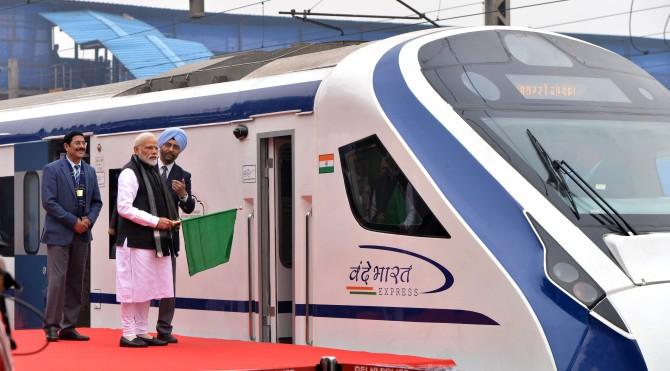On August 15 last year, Prime Minister Narendra Modi announced from the ramparts of the Red Fort that the Indian Railways would launch 75 Vande Bharat Express trains by August 2023.

Later, in her 2022 Budget speech, Finance Minister Nirmala Sitharaman announced that 400 Vande Bharat trains will be manufactured in the next three years, which are expected to cost between Rs 40,000 crore and Rs 50,000 crore.
Those upbeat announcements come after a series of cancelled tenders, vigilance actions against officials and interdepartmental rivalry that delayed the addition of these iconic trains developed entirely indigenously by the Integral Coach Factory (ICF) in Chennai.
The project, which was treated on a par with India’s Chandrayaan mission, had faced a rough ride starting from February 2019.
More than three years since then, only two Vande Bharat Express trains are running on Indian tracks — New Delhi-Varanasi and New Delhi-Katra.
Till January 2021, three tenders were floated inviting private sector participation, and all of them were cancelled on technical grounds.
At present, 102 train sets are in the process of being manufactured mainly in Railways-owned factories — ICF, Chennai, Rail Coach Factory in Kapurthala and Modern Coach Factory in Raebareli.
The 102 train sets in the pipeline include tenders for 44 sets that have been awarded to Hyderabad-based Medha Servo Drives, a 38-year-old engineering firm that develops high-tech electronics products for locomotives, train sets and railway stations and yards. The tendering processing has begun for another 58.
When the project was first launched, Vande Bharat trains were meant to be a great leap forward with European-style cushioned comfortable seats, rotating seats in executive class, diffused LED lighting, personalised reading lights, automatic entry and exit doors, fully sealed gangways for dust-free interiors, and modular bio-vacuum toilets.
When this reporter was part of the first ride of the train to Varanasi on February 15, 2019, it was also considered the first-of-its-kind “engine-less” train set — which runs on distributed traction and is designed to achieve a speed of 180 km per hour. At the on-board press conference, then Railways Minister Piyush Goyal had announced that permission to make 100 more Vande Bharat-like train sets had been given.
The slow progress of the project stands in contrast to the speedy development of the first models that rolled out from the ICF Chennai in 2018 — 18 months against the international norm of 36 to 42 months.
The project was, in fact, initially seen as a feat of indigenous engineering by the facility.
So, why the slow progress since?
A major reason for the delays in expanding the project has been vigilance enquiries against a group of officials in the manufacturing team following complaints that undue favour was shown to a domestic company for the purchase of electrical equipment.
The rivalry between the mechanical and electrical wings in the Railways also slowed developments.
It is also alleged that certain vested interests in the Railways had a stake in the delays so that the government would be forced to place orders with multinational manufacturers.
“All the euphoria was followed with crass negativism and a shebang of lies to discredit the train by vested and venal interests, who were following their own agenda of mala fide intentions,” said Sudhanshu Mani, the mastermind behind the iconic train, though he declined to go into specifics.
“The memories of the people of India giving an unequivocal thumbs-up to the train are stronger than those of the dirty tricks of these mercenaries,” he added.
Many of the team members saw their careers stalled because of these controversies, he added.
“To spread a message of positivity in respect of significant or meaningful deliverance among railway officers, they must be reinstated,” Mani said.
The two train sets in operation cost Rs 106 crore to manufacture in 2018, with 80 per cent of materials sourced from the domestic market.
The new ones, which include sleepers as well, may cost more due to the addition of new technologies.
This higher cost, however, is still likely to be less than imported trains of similar design, Railway officials said.
“After inaction of three and a half years, any replication of the new avatar of the train must necessarily be an improvement over the first two in respect of passenger comfort as well as technology.
"Moreover, the sleeper version of the train to replace the Rajdhanis, which we had started to design in 2018, and the aluminium-bodied version for which we had pushed for strongly, must be revived,” Mani pointed out.
Still, the PM and FM’s announcements reflected a vote of confidence in the Vande Bharat concept.
And for the moment, ICF Chennai, having been buffeted by triumph and then controversy, is happy to have received some orders and looks forward to more.
“We are waiting for this. We are happy that a huge business is going to come to ICF Chennai and happy that our efforts are materialising. Making 400 trains means huge business,” said P Mohandoss, general secretary of All India Railwaymen’s Federation.
Mohandass was referring to the number quoted in Sitharaman’s Budget speech.
It is this huge business that, the government is hoping, may change the future of the Indian Railways and put the country on a faster development track.
But the immediate test for the three Railway facilities will be to meet, at the very least, the prime minister’s immediate target of 75 trains by August 2023.











